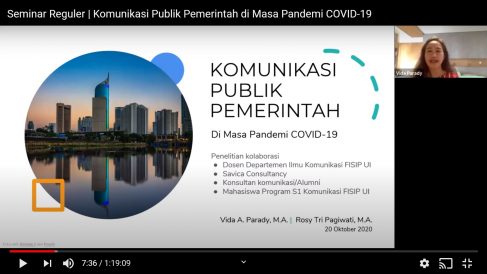LD FEB UI: Government Public Communication during the COVID-19 Pandemic
Hana Fajria – Public Relations of FEB UI
Depok – (20-10-2020) The Demographic Institute, Faculty of Economics and Business, Universitas Indonesia (LD FEB UI), held a webinar entitled “Government Public Communication during the Covid-19 Pandemic” on Tuesday, October 20 2020.
The seminar presented Vida Parady, MA., Adjunct researcher at LD FEB UI and Rosy Tri Pagiwati, MA, lecturer at the Department of Communication FISIP UI as speakers, and moderated by Dr. Paksi C. K. Walandouw, Deputy Head of Research LD FEB UI.
This study aims to understand and analyze the government’s public communication efforts in responding to the COVID-19 pandemic, analyze public understanding and perceptions of the government’s public communication efforts, and propose an ideal communication model to deal with crises.
Vida Parady and Rosy Tri Pagiwati found that at the beginning of the pandemic, there was a void of information which caused a domino effect on the overall performance of government public communications. In addition, government public communication focused on increasing awareness, but has not yet effectively led to changes in behavior. The central government’s public communication approach has also not maximized the role and capacity of local government and community organizations, as well as other agents of social change. The communication channels used have not considered the accessibility of all components of the Indonesian society.
Vida explained that the government’s communication process using the pentahelix principle (involving representatives from a number of different sectors) found indications of sectoral egos. In addition, the government prioritized a crisis communication approach (not a risk), without a clear and measurable monitoring and evaluation mechanism, while campaigning for behavioral change in a limited and less intensive manner.
Meanwhile, Rosy explained the proposed communication model that the government could use to carry out public communication in handling the COVID-19 pandemic. The transactional communication model adopted from the Gamble & Gamble pair communication model is adapted to conditions in Indonesia, which adhered to three factors. First, regional autonomy which concerns matters and obligations of the autonomous region to regulate the interests of local communities, in accordance with the Law on Regional Government. Second, the principle of transparency, which is related to accountability in the government’s administration, that submitted information must be open, clear and accountable. And third, the principle of anonymity related to the issue of protecting the freedom of expression. (hjtp)
(am)




